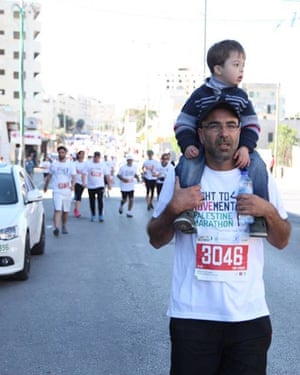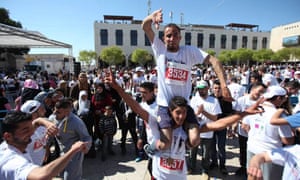Running through conflict: the Palestine Marathon
“It was amazing!”
Anyone who knows a marathon runner has heard those words, or something similar, from an adrenaline-fuelled finisher on their post-race high. But this runner’s passion and excitement was fuelled by a very different reason. For my friend Miriam, the Palestine Marathon was not about time or even about being able to say she had run a marathon. This race was about showing solidarity with those who have less freedom than her, and was an expression of becoming part of a new community. In the UK, we might ask people to sponsor us to run for a cause, but here the race is the cause.
Part of the Ramallah arm of Right to Movement (RTM), a running community named after article 13 of the Universal Declaration of Human Rights, Miriam (from the UK), Abed (from Palestine) and Luna (from Costa Rica) spoke to me the day after the race to explain why it merits particular attention. From the way they describe it, the atmosphere was a bit like a large-scale parkrun, but with more sheep, more dates and more of a cause. This year, 4,371 people took part in either the 10k, half or full marathon. Wheelchair users, children, OAPs, women pushing buggies and wearing long scarves and trousers all race alongside serious athletes. At one point, the runners saw a flock of sheep and a shepherd coming in the other direction. Miriam likened the feeling of the race to a wedding party – a celebration of unity, a love of movement and a love of Palestine. Miriam tells me how one group of children remembered her name from the first lap and sang a song about her then next time they saw her. At the end, even exhausted first time marathoners turned back to help bring other people over the finish line.

The Palestine Marathon is run in loops around Bethlehem starting at the Church of the Nativity and doubling back on itself passing two refugee camps and the Wall in the process. Only 5.5 miles away lies the disputed territory of Old Jerusalem. There is no route that can be run continuously before hitting a border or road block, and the race was started by RTM as a non-political way to draw attention to this issue. Their aim is to show how the Israeli-Palestinian conflict hinders the basic right to travel freely.
These restrictions affect even the most mundane, basic parts of marathon training. Think about those glorious long runs, those 20-milers where you set your legs to go and run as far as you can with no real plan. For RTM Ramallah, most of the training runs are done in circles around a very small area. This is partly a cultural issue, as it’s not common for women to run on their own, and also because there are no pavements in most of Ramallah, so it just wouldn’t be safe. However, there’s no denying that political tensions make heading out on a long, unplanned route impossible – you might end up running into a flying checkpoint, or an area where there are clashes between young people and the military.
Having completed their training, the next challenge is the simple act of getting to the race. Here, we might plan our route and take traffic, parking or unreliable trains into account. Miriam’s journey from Ramallah the day before the race went through a refugee camp, a building site and across a quarry in order to avoid road closures and checkpoints. Abed can’t travel through Jerusalem, so despite the fact the Bethlehem is just 13 miles away from his home town, he had to go into the mountains and around the edge of the city. Wisam, the organiser of RTM Ramallah, tells me that 80% of the runners from Gaza who were registered to take part in one of the races were not allowed to leave Gaza. Those DNF places you see at the bottom of every results list? There are rather a lot, with an unavoidable reason, here.

Running is booming in Palestine. On a Friday, when the majority of the country observes a day of rest, the roads are clear enough for bigger group runs – and RTM is growing all the time. Abed told me how one day he wants to run from Bethlehem to Jerusalem. Fatin, an American Palestinian, explained that she’d love to run by the beach, but she’d need a permit to get to the seaside and it’s just too difficult.
When it comes down to it, every marathon race is a simple case of left foot, right foot, repeat. RTM takes on just one aspect of the undeniably complicated and seemingly unsolvable situation in Palestine and uses that simple act to highlight the way in which the conflict effects everyday life. In the process, it seems that they have created a race that is full of heart (and sheep). Everyone I spoke to tells me that you can’t understand what it’s like until you’ve been there. So if you miss out on the London ballot next year, maybe Bethlehem should be your next stop.
- For more on Right to Movement’s global groups, visit: righttomovement.org.
- Follow Gill Bland at blandontherun.com, Twitter and Instagram.
Source: Read Full Article


